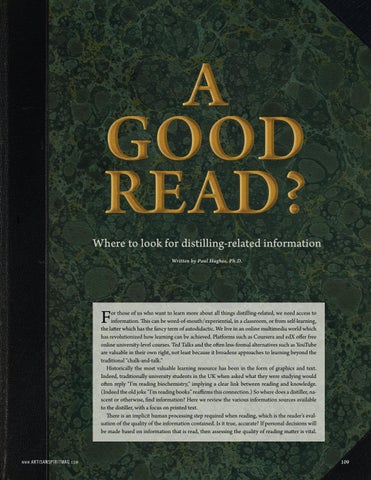Where to look for distilling-related information Written by Paul Hughes, Ph.D.
F
or those of us who want to learn more about all things distilling-related, we need access to information. This can be word-of-mouth/experiential, in a classroom, or from self-learning, the latter which has the fancy term of autodidactic. We live in an online multimedia world which has revolutionized how learning can be achieved. Platforms such as Coursera and edX offer free online university-level courses. Ted Talks and the often less-formal alternatives such as YouTube are valuable in their own right, not least because it broadens approaches to learning beyond the traditional “chalk-and-talk.” Historically the most valuable learning resource has been in the form of graphics and text. Indeed, traditionally university students in the UK when asked what they were studying would often reply “I’m reading biochemistry,” implying a clear link between reading and knowledge. (Indeed the old joke “I’m reading books” reaffirms this connection.) So where does a distiller, nascent or otherwise, find information? Here we review the various information sources available to the distiller, with a focus on printed text. There is an implicit human processing step required when reading, which is the reader’s evaluation of the quality of the information contained. Is it true, accurate? If personal decisions will be made based on information that is read, then assessing the quality of reading matter is vital.
W W W . ARTISANSPIRITMAG . C O M
109
